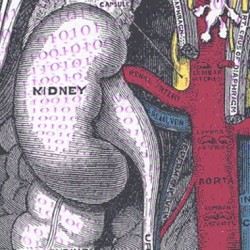By Helen Figueira
May 23, 2011
Time to read: 3 minutes
 Professor Tim Aitman awarded ERC Advanced Investigator grant
Professor Tim Aitman awarded ERC Advanced Investigator grant
Professor Tim Aitman has been awarded an Advanced Investigator grant by the European Research Council. The privilege boosts CSC research into the genetic causes of heart and kidney failure with a 2.5 million euro-grant. From June 2011–2016, Tim’s team will expedite the hunt for candidate disease genes and pave the way for new and better therapies for heart and kidney failure.
“We’re particularly looking at organ failure that has inflammatory causes,” explains Tim, “for example in diseases such as lupus or glomerulonephritis. While it’s increasingly clear that there is a genetic basis for these autoimmune disorders, specific treatments to target disease genes have not yet been developed.” Current treatments are broad-brush, for example immunosuppressive steroid drugs, which have serious side effects that leave patients vulnerable to other infections.
“Over the past two to three decades, we (and others) have used genetic linkage studies to look for genes and pathways involved in heart and kidney disease.” Current genome technology facilitates the comparison of disease gene pathways between humans and model organisms; in this case using rat models. “By looking at genetic differences between susceptible and resistant individuals”, says Tim, “we can identify candidate genes.”
His team (Physiological Genomics and Medicine Group) at the CSC has come up trumps in the past five years by discovering two genes that play a role in kidney failure. Both of these – Fcgr3 and JunD – help regulate immune cells called macrophages, which normally engulf foreign invaders. “In certain circumstances, because those genes are defective, macrophages can become over-activated and cause kidney damage.”
“Once we identify candidate genes, we can look at what they do and the networks and pathways in which they operate. For each gene, we’d like to know what the downstream effectors systems are that cause damage to kidney or heart, which we can investigate using powerful high-throughput technology for genome sequencing,” reveals Tim.
“Over the past decade, the cost of genome sequencing has come down a hundred-thousandfold. So, in the last two years, we’ve sequenced eleven genomes (see Understanding Hypertension). We have the genome sequences of many susceptible and resistant individuals. Using gene expression profiles, for example, if we find a gene that is highly expressed in a resistant individual, but expressed at much lower levels in a susceptible individual, then it’s worth investigating,” he adds.
Technological advance means that studying the function of a gene has become much more convenient. Tim’s team is using brand new technology to knock down genes of interest, so that they can explore the effects on different individuals. “Zinc-finger nuclease technology allows us to target individual genes very precisely,” he qualifies.
“Over the next five years, we will look at the genome sequences of individuals who do and don’t get disease to find disease genes,” Tim reaffirms. “So we narrow down the search using linkage studies, gene expression profiles to throw up candidates, genome sequencing and bioinformatics to probe gene networks and pathways, and gene-targeting to learn about function.”
The project has great medical potential, although what’s not certain is whether candidate genes will be ‘druggable’. As Tim explains, “only a small proportion of the genes in the human genome are druggable.” So if the team finds disease-causing genes, the really big question is, whether manipulating their function could prevent disease occurring. “And that would be a major result,” he exclaims.
The ERC Advanced Investigator Grant is a great privilege for Professor Aitman, his team and European research collaborators; and a tremendous support to the CSC research programme.
BM